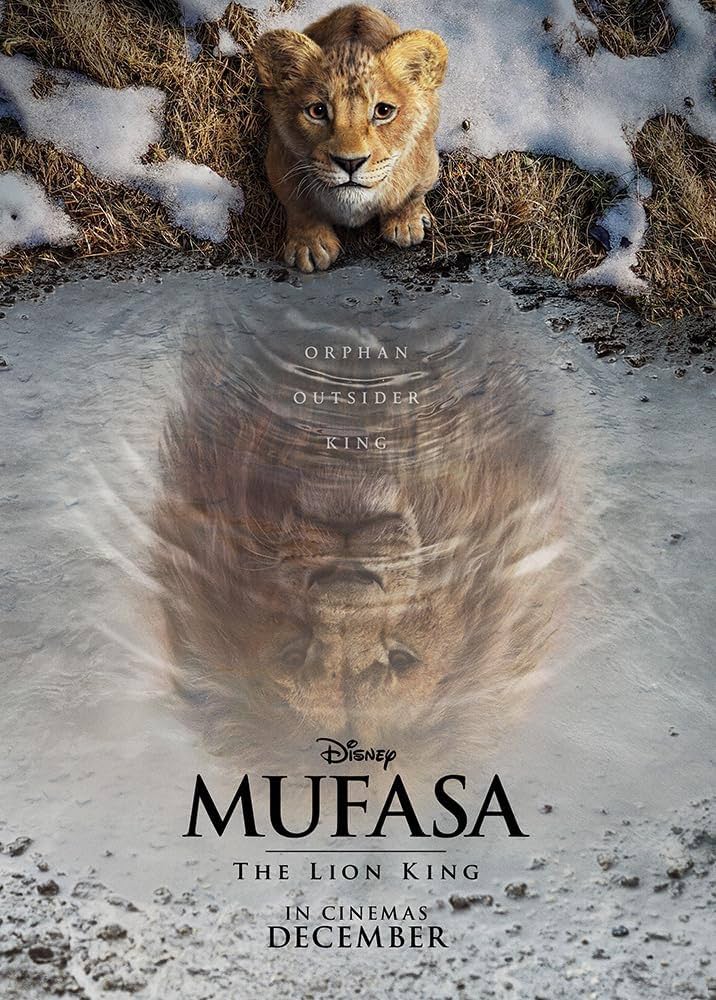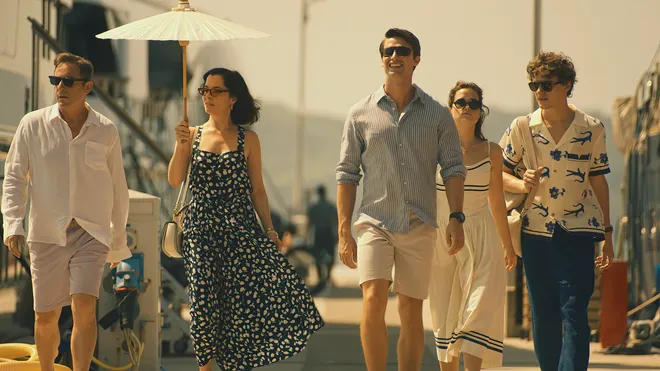Disney’s little live-action stint hasn’t led to much. “The Little Mermaid” swam right under the radar, “Mulan” eliminated the little dragon – which ruined the movie – and no matter how hard I try, I can’t see Dwayne Johnson playing Maui in a live action “Moana” as bringing anything good into this world, but that’s to be determined. However, in the case of “Mufasa,” the prequel that, to my knowledge, no one asked for, Disney managed to create something truly good while insisting on playing violin on the Titanic.
“Mufasa” is the prequel to “The Lion King,” telling the story of the titular character Mufasa (Aaron Pierre), Simba’s father, and his relationship with Taka (Kelvin Harrison Jr.), including how the latter became Scar. The movie focuses on Mufasa and Taka’s journey to the pride lands (the setting of the original movie), which they call Milele, and their escape from a vicious pride of white lions and their king, Kiros (Mads Mikkelsen), who wants to end all other royal bloodlines to become the only lion king. It is told through a series of flashbacks, routinely interrupted by Timon (Billy Eichner) and Pumba (Seth Rogen), in which the mandrill Rafiki (John Kani) tells the story to Simba (Donald Glover) and Nala’s (Beyonce) daughter, Kiara, played by Blue Ivy Carter, Beyonce’s daughter, in her feature film debut.
The plot is developed and entertaining. We understand how Mufasa becomes the mighty king seen in “The Lion King,” and, more importantly, we understand how Scar became the wretched yet suave villain in a satisfying way. The movie doesn’t say ‘because,’ it explains ‘how.’
The movie features a mix of real world filming and cgi for the animal characters, the cgi being magnificently pulled off. Something inherently difficult with the creation of such a movie is communicating human emotion and expression in a realistic animal character, something traditional animation doesn’t struggle with. A cartoon Simba can smile. An actual lion showing teeth makes you wonder how much longer you’ll live.
However, “Mufasa” manages to animate the animals in a way that looks realistic, while also having them show emotion. You can read the distress on Mufasa’s face when Taka betrays him, and you can see the malevolent glint in Kiros’s eyes when he speaks about being the only lion king.
Another thing that helps with this communication of emotion is the voice acting. Aaron Pierre and Kelvin Harrison Jr. imbue their characters with deep feeling through only voice acting, and it’s impressive to hear.
Additionally, one of my favorite parts of the movie was Lin Manuel Miranda gifting us a wonderful soundtrack. I particularly enjoyed Kiros’s musical number, which Mads Mikkelsen performs quite admirably, delivering a perfect villain performance and sending shivers down the audience’s spines. Other musical performances were also great, but not all of them hit the spot in the same way as Kiros’s “Bye Bye”.
My one strong critique of the movie is that it’s not graphic enough in terms of action. I understand that Disney is mostly oriented towards kids, who have a lower tolerance for scary scenes, but is it too much to ask to see Lions really fighting? There’s only one fight scene in the movie at the climax, but it ends up being pretty anticlimactic.
I’m not asking for gore and blood splattering the screen, but a little more action would have been welcome. It’s clear that the characters that Kiros is singing to are going to die, but we don’t see any fighting. Kiros just stops singing, and we’re left vaguely wondering if any lions got away (as far as we know, none do). A lunge towards the camera would have been appreciated, at the very least.
The supporting characters are well fleshed out. Rafiki plays an appreciated role in the story of Mufasa, functioning as a guru and comic relief. Zazu (Preston Nyman) shows up, bringing his signature haughty air to the screens and providing additional comic relief, while Tiffany Boone’s Sarabi (Simba’s mother) possesses a level of emotional depth that I did not expect from a character that I had honestly forgotten existed. You actually care about the rest of the cast, instead of having them as afterthoughts.
Overall, I would consider “Mufasa” a success. The cgi is beautiful and well used, the plot is engaging and developed, the characters are entertaining and attaching, and you feel genuinely connected to the movie. After watching “Mufasa,” I went home and watched “The Lion King” for the first time in at least five years, which just goes to show that one of the greatest accomplishments of “Mufasa” is that it brings back interest towards the magnificent universe of the pridelands. Once you’ve seen the story of this great king, we all feel part of the pride.

























